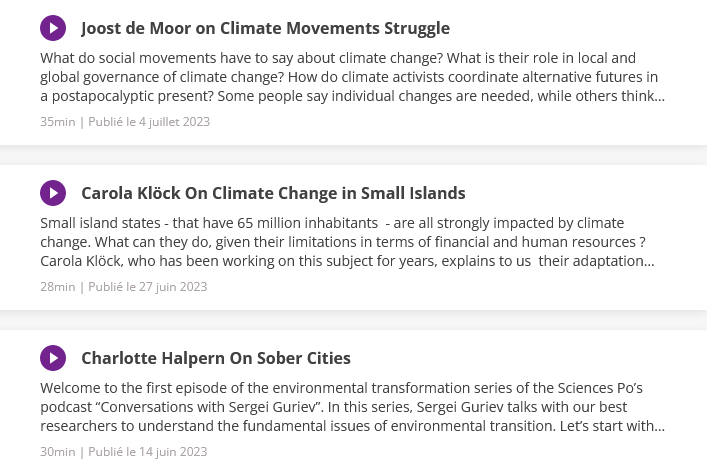2024 QS Rankings: Sciences Po Second in the World in "Politics"
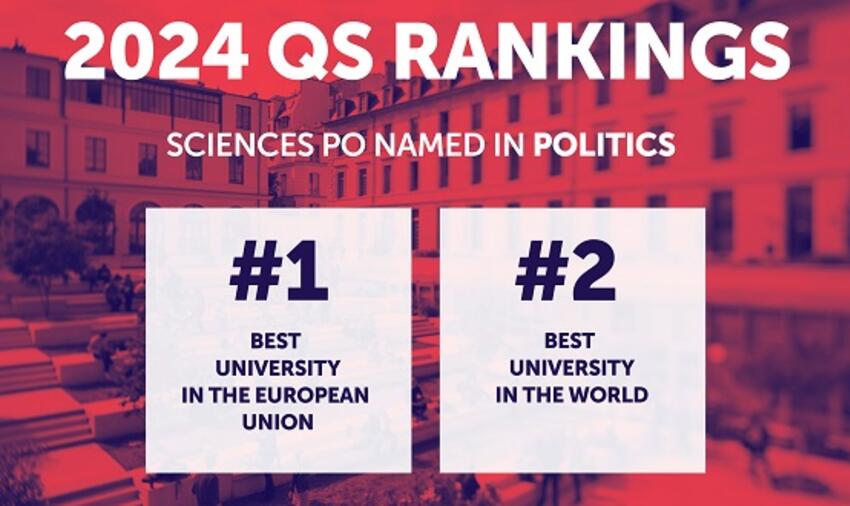
 Sciences Po 2024 QS Rankings
Sciences Po 2024 QS Rankings
10th April 2024
According to the QS World University Rankings by Subject 2024 revealed today, Sciences Po has risen this year to the rank of 2nd best university in the world in “Politics” out of more than 1,500 international universities. For 6 years, Sciences Po has been in the top 3 of the best international universities in this category. Sciences Po also remains the leading university in the European Union in this discipline for the ninth consecutive year and the first time, the 1st in Europe.
Academic and Research Excellence
These results attest to the excellence of the research carried out and the courses provided at Sciences Po. By maintaining its position in the world's top 3, Sciences Po is ahead of the University of Oxford, Princeton University and the London School of Economics and Political Studies (LSE).
Every year, the QS Rankings by Subject compares more than 1,500 universities worldwide. The results of this ranking have shown, year after year, that Sciences Po is one of the world's leading universities in humanities and social sciences.
Stand-out results in other subjects
The high quality of Sciences Po's teaching and scientific research activities allows the institution to stand out in other subjects:
- Social Policy and Administration: Sciences Po recorded an increase of seven places and is thus ranked 13th in the world and maintains its first place in France.
- Sociology: ranked 27th worldwide and first in France.
- Law and Legal Studies: Sciences Po moved up one rank, reaching 64th place globally and second in France.
- History: Sciences Po joins the world top 100 and is ranked 4th in France.
Congratulations to professors and researchers
"This year’s rankings once again confirm that Sciences Po is a world-class research university recognized for its academic excellence in social sciences, interdisciplinary research and innovative teaching programs, for highly diverse and international student body, and for its commitment to academic freedom and the common good. The 2024 QS rankings are a well-deserved appreciation of our faculty and staff’s hard work and dedication to the Sciences Po’s mission : Understand our times, make a difference”.
Sergei Guriev, Provost at Sciences Po
Philippe Martin: The Legacy of a Leading Economist
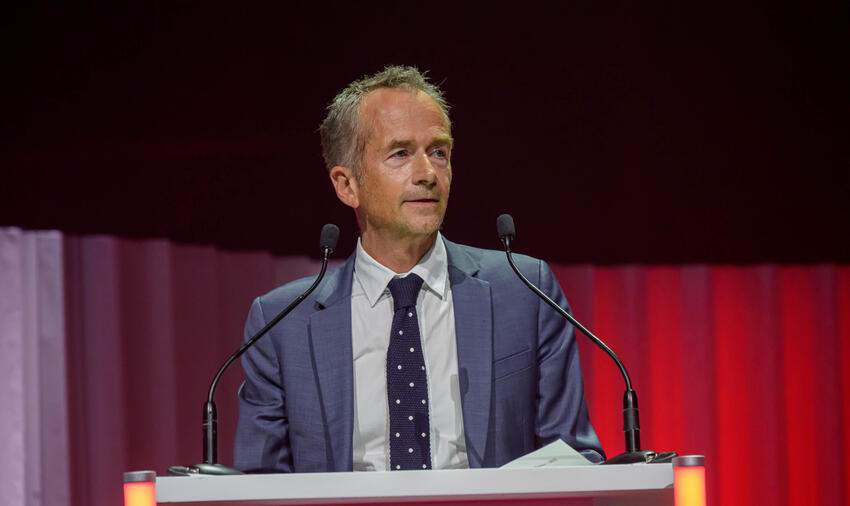
 Actualité Sciences Po
Actualité Sciences Po
Patrick Le Galès elected to the French Academy of Technologies
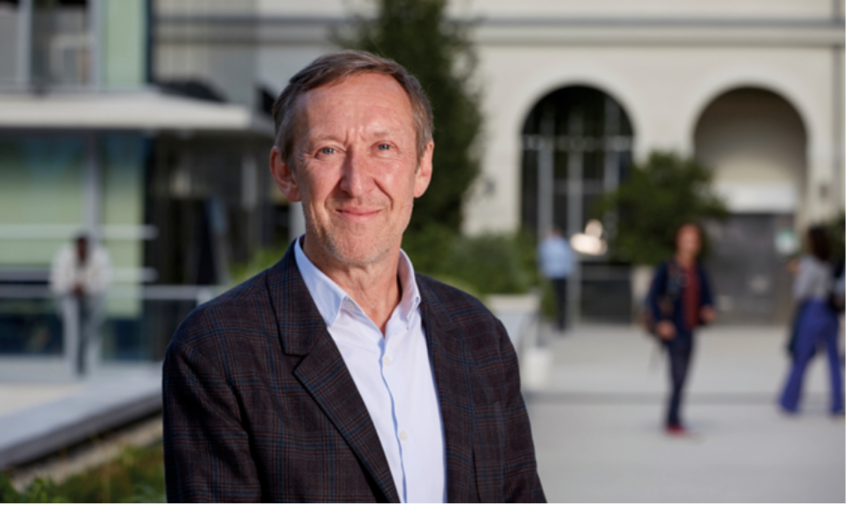
 Patrick Le Galès © Alexis Lecomte / Sciences Po
Patrick Le Galès © Alexis Lecomte / Sciences Po
Emiliano Grossman Is the New Director of the Center for Socio-Political Data
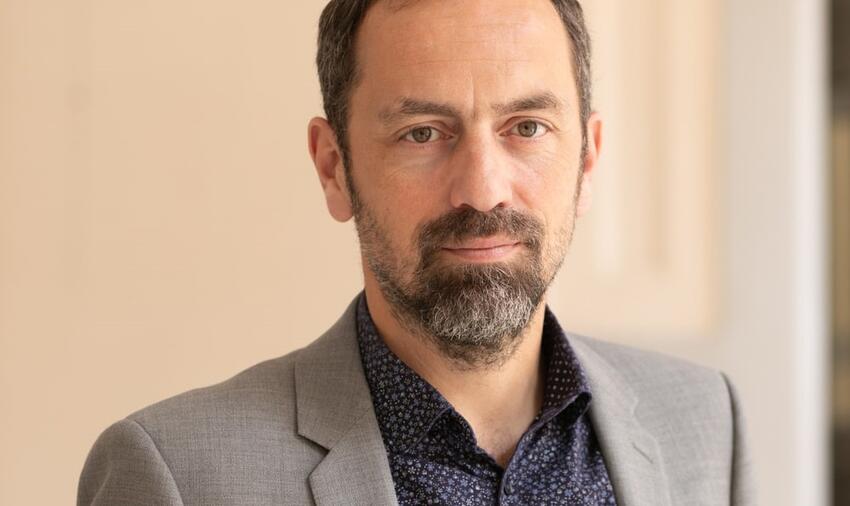
 Crédit : Celine Bansart / Sciences Po
Crédit : Celine Bansart / Sciences Po
Emiliano Grossman, professor at Sciences Po, has been appointed director of the Center for Socio-Political Data (CDSP). He succeeds Nicolas Sauger, who has held the post since 2017.
A teacher and researcher specialising in comparative politics
Emiliano Grossman is a senior research fellow at the Centre for European Studies and Comparative Politics (CEE). His research focuses on comparative political institutions and the comparative analysis of public policy. He works on attention cycles in politics and on partisan strategies in a political context that increasingly restricts the autonomy of governments.
He leads a project about political agendas, funded over several years by the French National Research Agency (ANR), which aims to develop quantitative indicators of the evolution of political institutions in France.
Emiliano Grossman is the scientific adviser for the "Politics and Public Policy" stream of the Master's in Public Policy at Sciences Po's School of Public Affairs. Furthermore, he teaches comparative politics at the Paris campus.
A Sciences Po alumnus, with an MPhil from Cambridge University, he completed his doctoral thesis at Sciences Po and then his habilitation to direct research at an Institute for Political Studies in Grenoble. Since September 2017, he has been co-editor-in-chief of the European Journal of Political Research.
The CDSP, a benchmark data centre for the social sciences
The CDSP is one of France’s major centres for the production and handling of social science data. It is a key player in the documentation, preservation and production of data. It is also a centre of expertise on quantitative and qualitative methods, associated with the great national and European research infrastructures.
A support and research unit (UAR 828) set up in 2005 by Sciences Po and the CNRS, the CDSP if sustained by a team of more than 20 developers, engineers and data specialists.
The CDSP is developing a range of infrastructures, platforms and services aimed at the academic community and fully engaged with an open science approach. In this capacity, CDSP provides expertise relating to probability panels and online surveys, metadata standards, and the development and implementation of application infrastructures for research.
The CDSP’s activities are also structured by several major projects, including the ELIPSS online probability panel (online longitudinal survey for the social sciences), the European Social Survey in France, but also the institutional research data repository, experiments on data handling procedures as well as the production of a sample management application within the framework of comparative web panels.
Emeric Henry Appointed as the Department of Economics Director
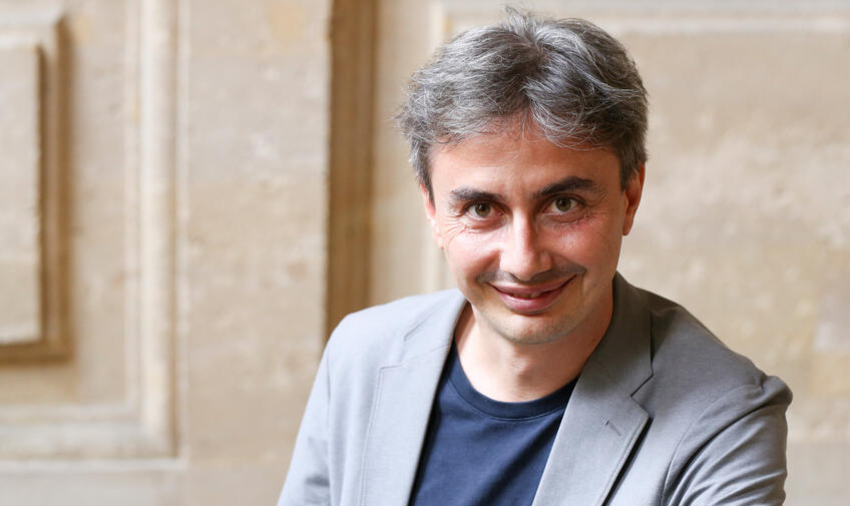
 Actualité Sciences Po
Actualité Sciences Po
Paris, 16 janvier 2023
A professor at our Department of Economics since 2009, Émeric Henry is also a research associate at the Centre for Economic Policy Research (CEPR). From 2013 to 2019, he was the director of the master's degree and doctorate in economics at Sciences Po.
A Microeconomics and Digital Economy Specialist
He holds a master's degree in statistics and economics from ENSAE and a master's degree from Stanford University, and defended his PhD in economics at Stanford. Before joining Sciences Po in 2009, Emeric Henry worked as an assistant professor at the London Business School.
A renowned microeconomist, Emeric Henry uses economic theory, experimental and empirical methods to conduct his research. His areas of research include the economics of innovation, the digital economy and political economy. He publishes in leading international journals in economics and other fields, including the Journal of Political Economy, the American Economic Review, the American Economic Journal, the Journal of the European Economic Association, Proceedings of the National Academy of Sciences, Plos One, Management Science, etc.
In 2009, he was awarded the "Chaire d'Excellence Junior" (Junior Excellence Chair) by the French National Research Agency (ANR) and several other ANR grants. Emeric Henry was awarded the “Deutsche Bahn Prize” jointly with Yann Algan, also a researcher at the Department of Economics.
A Department with an Ambitious Teaching and Research Strategy
The Department of Economics was launched in 2009, when Sciences Po decided to create a new dynamic in economic research led by its permanent faculty, to "re-fundamentalise" the teaching of economics and to raise the international recognition of its research centres.
Although the Department initially developed around a focused core of topics – i.e. political economy, international economics, labour economics and econometrics, these topics have broadened to now include a strong group of theoretical economists, a team of researchers specialised in development economics, and expanded vastly its expertise in macroeconomics, and industrial organisation.
In 2016 - only seven years after its creation - the Department was accredited by the French National Centre for Scientific Research (CNRS), when it became an "Unité Mixte de Recherche" (mixed research unit). The evaluation of the Department of Economics in 2018 by the national evaluation agency (HCERES) highlights the fact that its ambitious policy has allowed the Department to climb "to the top of the world hierarchy".
The Department's researchers have brought home 13 coveted European Research Council (ERC) grants as well as substantial national funding by the French National Research Agency (ANR), among many others. It was one of the institutional partners for the teaching of economic history in the shape of a 3-year Marie Curie "International Training Network" programme (MACROHIST). The Department attracts a large array of long-term visitors from the most prestigious North-American and European universities.
In recent years, the Department has been honoured to host high-end events, as the Society for Institutional and Organizational Economics' Annual World Conference in 2016 or the Restud Tour in 2019.
Its students are placing remarkably well: the top graduates from the Master's programme who subsequently pursued a PhD were admitted to the most prominent PhD programmes (Berkeley, Yale, Duke, Northwestern, as well as Sciences Po) and our young doctors have been recruited by top universities around the world (UCLA, Leuven, ENS Paris, HEC Paris, Carlos III, INSEAD...).
Kevin Arceneaux Elected Director of the Centre for Political Research
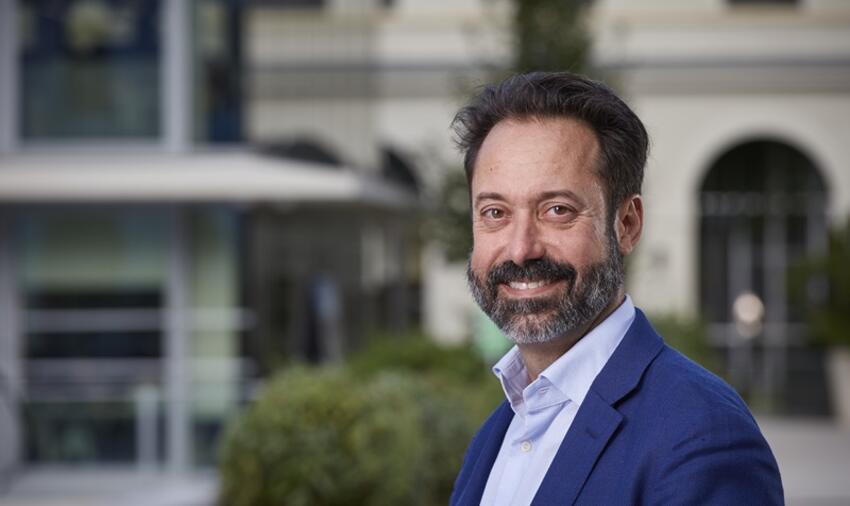
 Kevin Arceneaux. Crédits image : Alexis Lecomte / Sciences Po
Kevin Arceneaux. Crédits image : Alexis Lecomte / Sciences Po
Kevin Arceneaux, Professor of Political Science, has been elected director of Sciences Po's Centre for Political Research (CEVIPOF). He took office on 1 January 2024 and succeeds Martial Foucault, who had held this position since 2014. Anne Muxel will accompany him in this new challenge as deputy director.
An international director to strengthen transversality and excellence
Kevin Arceneaux is American, and the first international director of CEVIPOF, a centre that was founded more than 60 years ago. His appointment testifies to the excellence, international reputation and openness of this historic Sciences Po research centre, whose researchers have been studying French, but also international, political life for several years now.
As director of CEVIPOF, Kevin Arceneaux will lead initiatives aimed at strengthening the excellence and uniqueness of this research centre, renown in particular for the quality and relevance of its studies and analyses of elections.
“I sincerely thank all of my colleagues at CEVIPOF and theCNRS for their trust, and I am very honoured to begin this new mission. As the European elections will take place next June, I particularly want to make them a major subject of research within our centre. I also wish to strengthen the transversality between the three poles of CEVIPOF: the analysis of elections and opinion studies, the life of institutions and political philosophy. Finally, as part of Sciences Po’s greater outreach, I intend to open CEVIPOF, its research and its events to the public,” comments Kevin Arceneaux.
Professor of Political Science, Kevin Arceneaux studies public opinion and political media. After a doctorate at Rice University, then a post-doctoral fellowship at Yale within its Institution for Social and Policy Studies, he joined the permanent faculty of Temple University in 2005. He first worked there as Associate Professor in the Department of Political Science, then joined its Institute for Public Affairs in 2006. In 2013, he became director of the Behavioral Foundations Lab at Temple University. In 2018, he was named the Thomas J. Freaney Jr. Professor at Temple University.
In 2021, Kevin Arceneaux became a teacher and a researcher within Sciences Po and CEVIPOF research team which, in 2019, welcomed him as a guest researcher. At the same time, he continues to work for the Temple University Behavioral Foundations Lab as an associate researcher.
CEVIPOF, a major centre for research in political science
CEVIPOF (Centre for Political Research at Sciences Po) was founded in 1960 by Jean Touchard. It became a joint Sciences Po-CNRS research centre in 1968. Ever since it was first created, CEVIPOF has been considered to be one of the major centres for research in political science as demonstrated by academic appraisal, feedback from the public debate arena and the expertise it provides to government. While it offers an in-depth focus on the political sphere in France, much of the work carried out at the centre adopts a comparative approach while other themes are global in scope. The centre plays a vital role at the interface between research and politics providing a valuable resource for political actors, society at large, economic decision makers and the media.
CEVIPOF is a multidisciplinary research centre, which draws on an extended landscape of methodological resources. These include quantitative and qualitative methodologies to process surveys and opinion polls, longitudinal studies, big data and discourse analysis, theoretical comparative research, and also a number of techniques specific to socio-physics. CEVIPOF has been conducting systematic electoral studies since 1968 when it became a joint Sciences Po-CNRS centre, thus providing a unique and cumulative series of data comparable over time.
The 24 researchers and 27 doctoral and post-doctoral students of CEVIPOF publish their work in a wide variety of leading international journals and are regularly invited to present their research at international academic events. The centre hosts a number of visiting researchers throughout the year. It also organises conferences and academic events on a regular basis, thus creating a platform for its ever-expanding international network to interact and develop their mutual interests in the political sciences.
Stéphanie Balme Elected Director of the Centre of International Studies (CERI)

 Actualité Sciences Po
Actualité Sciences Po
Paris, January 10, 2024
Stéphanie Balme, Research Professor and the institution's Academic Freedom referent, has been elected Director of Sciences Po's Centre de recherches internationales (CERI). Stephanie Balme became the first female director of this joint Sciences Po - CNRS research unit and took up her post on January 2, 2024, succeeding Alain Dieckhoff (CNRS) who had held the position since 2013.
As head of the CERI, Stéphanie Balme will lead a policy of scientific excellence in international relations and comparative politics, focusing on the professional integration of young researchers, the development of major ANR and ERC projects, the integration of the laboratory into innovative national and international academic networks, and a genuine scientific mediation strategy. Following the laboratory's founding principles, she also hopes that CERI will remain at the forefront in welcoming scientific refugees.
"I am sincerely grateful to my colleagues at Sciences Po and the CNRS for their trust. I approach this mandate with the enthusiasm and sense of commitment that they know me for, while being aware of the challenges linked to the exercise of the profession of international researcher in a torn global space. To promote CERI's excellence, I'm delighted to be able to count on the exceptional collective intelligence of the team, as well as the support of the two deputy scientific directors, Laurence Louër (FNSP) and Hugo Meijer (CNRS)", comments Stéphanie Balme.
Stephanie Balme is an internationally-renowned specialist in the political and judicial systems of post-Mao China and Sino-European relations, whose career has been marked by extensive international experience. Having worked on three continents and lived in China for thirteen years, she holds a PhD in political science and an HDR (habilitation to direct research) in law. She has held various research and teaching posts at institutions such as the Chinese University of Hong Kong (CUHK) and Tsinghua University in Beijing. She has also been a visiting professor at UQAM (Montreal), Ashoka (New Delhi), UBC (Vancouver) and Columbia University Law School (New York). She has also acted as a consultant for several international and European organizations. In 2017, she broadened her field of expertise to include science diplomacy during an assignment with the French Ministry of Europe and Foreign Affairs. From 2018 to 2023, Stéphanie Balme was Dean of Sciences Po's College Universitaire, committed to pedagogical innovation, working to bring together humanities, social sciences and hard sciences, and strengthening links between teaching and research. She has been professor at Paris School of International Affairs of Sciences Po (PSIA) since 2012, sits on the scientific councils of IHEDN and IRSEM, and has just been appointed associate researcher at the International Council for Science.
CERI has been at the heart of her academic career since her thesis under the supervision of Guy Hermet, political scientist and former director of CERI (1976-1985), a leading specialist in Latin America and the democratic transitions of authoritarian regimes. Under the influence of Guy Hermet, Stéphanie Balme's early research focused on the analysis of communist regimes in Asia. She is currently working on the affirmation of China's scientific and technological power. Her research interests include the impact of China's scientific diplomacy on international relations, contributing to work on the place of science in international relations and the global governance of science. In 2019, she co-founded the ESDI (European Science Diplomacy Initiative) with Pierre Lemonde and Enrico Letta.
The Permanent Faculty is enriched with 14 new members. Discover their profiles.

 Actualité Sciences Po
Actualité Sciences Po
Continuing its policy of strengthening its research, Sciences Po welcomed in 2023, fourteen new members to its permanent faculty. In their diversity, their own field of expertise, they explore the major changes in our societies. These new thinkers strengthen our research units, irrigate our courses at all levels of the curriculum , and reinforce Sciences Po's presence in public debate. Discover their bios!
Tribute to Philippe Martin
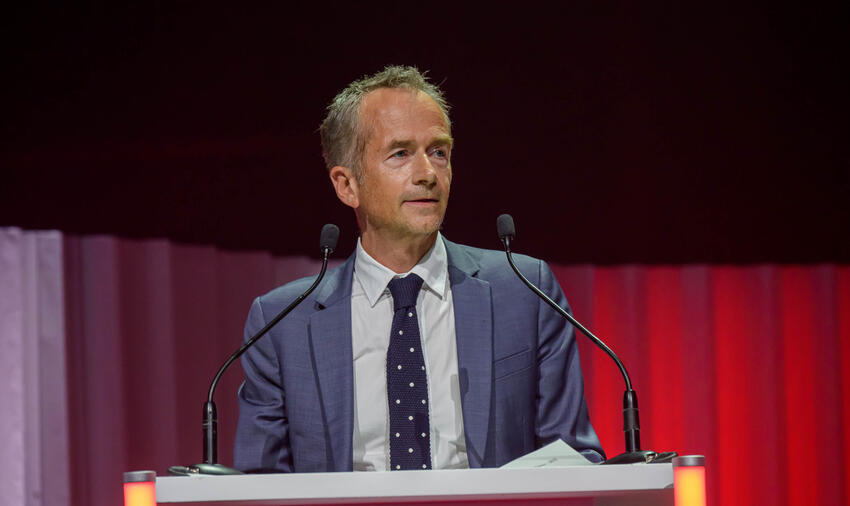
 Philippe Martin © Jean Claude Guilloux / Sciences Po
Philippe Martin © Jean Claude Guilloux / Sciences Po
18 December 2023
It is with great sadness that we announce the death of Philippe Martin, Professor at Sciences Po within the Department of Economics, Dean of the School of Public Affairs.
Philippe Martin was a leading economist, internationally recognised by his peers, who specialised in the field of international economics and economic geography, amongst others.
After studying at Sciences Po and obtaining a postgraduate diploma (DEA) from the Paris-Dauphine University, he then was awarded a PhD from Georgetown University.
He went on to become an economist at the Federal Reserve Bank of New York, a professor at Paris 1 Panthéon-Sorbonne University and at the Paris School of Economics, and a junior member of the Institut Universitaire de France (IUF), before joining Sciences Po in 2009. In 2002 he was awarded the prize for the best young economist in France.
A gifted, imaginative and prolific researcher, a professor respected and loved by his students, Philippe Martin was consulted by political, administrative and economic leaders (he was the economic adviser to the Minister for the Economy, Industry and Digital Technologies from 2015 to 2017). He also sought to address a wider audience by regularly appearing in the media.
His academic influence and authority naturally led him to become a member of the most eminent bodies bringing together economists, such as the Cercle des économistes, the Centre for Economic and Policy Research (CEPR), where he was a Research Fellow and Vice-Chairman, and the Conseil d'analyse économique (CAE), of which he was Deputy Chairman.
At Sciences Po, Philippe Martin played a decisive role on many occasions.
He was one of the founders and the first director of the economics department, to which he gave decisive scientific recognition and impetus in just a few years.
In 2021, he was appointed a member of the FNSP's Board of Directors , in the college of representatives of the founders, and then elected to the vice-presidency.
Since February 2022, he was the Dean of the School of Public Affairs. It was a position he loved deeply, perhaps because it brought together all that he held dear, beyond research: teaching, students, public service and action, and the power of working together.
An account of his academic talents and the eminent positions he held cannot capture who Philippe Martin truly was. There was something about him that escaped hagiographic considerations, however well-founded.
A rigorous and acute thinker, Philippe Martin showed insight and courage in all circumstances, and with all who crossed his path. Nothing about him was ostentatious, contrived or affected; he was unwavering , honest and always got to the heart of the matter. Never a hypocrite, never afraid to take on a fight or irritate, he was nonetheless extremely attentive to others, with the discretion and sensitivity of those who take a genuine interest in others.
We are all, at the School of Public Affairs, in the Department of Economics, among the deans, members of the faculty, Sciences Po teams and students, deeply saddened.
We must nonetheless keep in our minds and hearts the image of Philippe as he was and as he will remain in our memories - spirited, sharp, elegant, gentle and generous.
Final CIVICA Research Conference

 CIVICA Research Conference 2023. Crédits photo : Alexis Lecomte
CIVICA Research Conference 2023. Crédits photo : Alexis Lecomte
Navigating Insights and Fostering Collaboration
In the vibrant backdrop of Paris, Sciences Po set the stage for the zenith of the CIVICA Research project—the CIVICA Research Conference 2023. Held on October 12 and 13, this gathering brought together early-stage researchers, professors and higher education experts across and beyond CIVICA – The European University of Social Sciences.
With over 300 enthusiasts expressing their eagerness to attend both virtually and on site, the conference emerged as a triumph of collaborative research and innovation in the social sciences. Over two dynamic days, 34 speakers engaged in compelling discussions on topics ranging from migration and integration to data sciences, social behaviours, democracy, and climate change.
Inaugurated by Mathias Vicherat, President, and Sergei Guriev, Provost of Sciences Po, the event highlighted the flourishing state of European research. "Today, we celebrate the incredible results achieved over the past three years in research and innovation in social sciences," declared President Vicherat, with Provost Guriev echoing the commitment to future project development within the alliance.
After four and a half years of deprivation of liberty, Fariba Adelkhah is back in France
8449.png?1697652043)
 Actualité Sciences Po
Actualité Sciences Po
Two Researchers Receive Starting Grants from the European Research Council
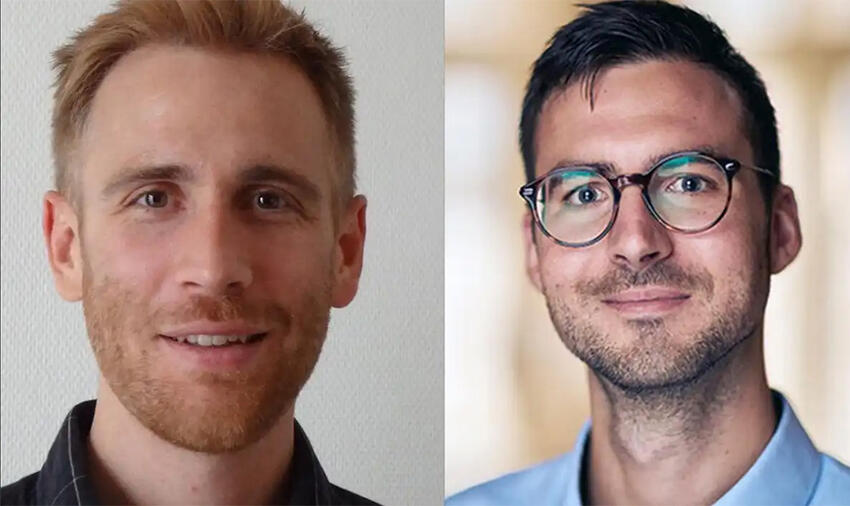
 Philipp Brandt - Zachary Van Winkle
Philipp Brandt - Zachary Van Winkle
Receiving funding from the European Research Council is an indisputable mark of excellence for a researcher, so competitive is the selection process.
Two young researchers from Sciences Po - Philipp Brandt and Zachary Van Winkle - have just received this international recognition by winning two Starting Grants, funding awarded to researchers at the start of their careers who have already produced excellent work and have the potential to distinguish themselves in the research world.
Philipp Brandt conducts research on non-standard work trajectories
Philipp Brandt, researcher at the Centre for the Sociology of Organisations (CSO), will undertake a research project on “Returns to Work in Occupational, Relational, and Corporate Settings”. Philipp Brandt focuses on the surprising, unexpected and unusual changes in the trajectories of male and female workers. What are the consequences of switching to a completely different profession, or applying a new method to one's workstation? Is there an increase in pay, or a change in position? What are the differences between the situations of men and women? This research uses innovative data sets and computer techniques. The first part attempts to capture different institutional contexts, focusing on job change sequences at national level for France, Germany and the USA. The second part looks at how workers in two types of occupation, one more intellectual and the other more applied, carry out their work while changing professional and organisational frameworks, and the effects this has. Finally, a last study, a combination of the first two parts, focuses on workers and how they interrogate conventional job presentations depending on whether they are in standard or non-standard work trajectories.
Philipp Brandt completed his PhD at Columbia University and worked at the University of Mannheim as a post-doctoral researcher, where he received the 2019 Teaching Award from students in sociology and political science. He is completing a book project on the emergence of the data scientist profession and a study of migrant workers in German companies.
Zachary Van Winkle studies the impact of widowhood worldwide
Zachary Van Winkle, a researcher at Sciences Po's Centre for Research on Social Inequalities (CRIS), will be tackling a sensitive and understudied subject “A Social Demography of Widowhood across Ageing Societies”. While the loss of a spouse is a critical emotional moment, it also has long-lasting consequences, particularly in terms of economic vulnerability. Not only is mental health damaged - anxiety, insomnia, depression, loneliness - but income is also affected, with serious consequences, particularly in relation to housing. Two other aspects of the project make it an innovative piece of research: the comparison of widow/widower trajectories in sixty countries, and their evolution in a historical perspective.
In 2018, Zachary Van Winkle had already gained recognition for his doctoral work, receiving the prize for best thesis awarded by the European Consortium of Sociological Research and the German Society for Demography. Before joining Sciences Po, he had carried out research at Oxford University, as a post-doctoral fellow.
Bruno Latour Fund: Presentation of Awardees

 San Rafael Falls. The Largest Waterfall in Ecuador © 2003-2023 Shutterstock
San Rafael Falls. The Largest Waterfall in Ecuador © 2003-2023 Shutterstock
Paris, July 21 2023
A New Climate for Social Sciences
Postdoctoral Research Program at Sciences Po on the Environment
Sciences Po is proud to announce the results of the selection for its postdoctoral research program on the environment, "A New Climate for Social Sciences - Bruno Latour Fund." This program is dedicated to the study of environmental and climate transformations and is co-directed by Pierre Charbonnier and Charlotte Halpern, researchers at the Center for European Studies and Comparative Politics at Sciences Po.
By this autumn of 2023, ten young researchers will join one of Sciences Po's 11 research centers. Through their research and teaching, they will contribute to consolidating and developing Sciences Po's environmental expertise in a resolutely interdisciplinary approach over the next three years.
The awardees, along with their affiliated laboratories, are:
- Pia Bailleul, Center for International Studies
- Camille Besombes, médialab
- Bastien Cabot, Center for History
- Inès Calvo, Center for International Studies
- Anastasiya Halauniova, Centre for the Sociology of Organisations
- Gustav Kalm, Law School’s research centre
- Thomas Kayzel, Center for European Studies and Comparative Politics
- Oda Nedregard, Department of Economics
- Cassandre Rey-Thibault, Center for European Studies and Comparative Politics
- Emelyn Rude, Center for History
This scientific program has generated considerable interest, attracting applicants from around the world. The selection of these ten young researchers was based on their academic excellence, ability to conduct innovative research, and commitment to deepening our understanding of current environmental and climate challenges.
The selection committee, led by Pierre Charbonnier (philosopher, Center for European Studies and Comparative Politics), included Lucas Chancel (economist, Center for Research on Social Inequalities), Sophie Dubuisson-Quellier (sociologist, Centre for the Sociology of Organisations), Jérôme Gaillardet (geochemist, Institut de physique du globe de Paris, Université Paris Cité), Charlotte Halpern (political scientist, Center for European Studies and Comparative Politics), Giacomo Parrinello (historian, Center for History), Alain Pottage (jurist, Department of Law), Géraldine Pflieger (University of Geneva), and Sandrine Revet (anthropologist, Center for International Studies).
The Bruno Latour Fund represents Sciences Po's commitment to cutting-edge research on environmental transformations and intellectual cooperation. By providing a stimulating environment, Sciences Po positions itself as a key player in shaping debates and policies related to environmental and climate issues. The Fund is supported by ADEME, Caisse des Dépôts, BNP Paribas, Fondation Daniel et Nina Carasso, Rothschild & Co, VINCI, VINCI Autoroutes and Leonard.
We warmly congratulate the ten winning researchers and are delighted to welcome them to our research and education community.
Project Liberty's Institute Awards $1 Million in Grants

 Actualité Sciences Po
Actualité Sciences Po
Funding supports research on digital governance, future of governance of technology & social media; and decentralised networks.
SciencesPo and Project Liberty’s Institute (formerly the McCourt Institute) are pleased to announce the recipients of the 2023 research grants, totaling nearly $1 million in funding. Grantees will focus on the following issues: governance of the metaverse; misinformation & social media; digital identity; safety of Artificial Intelligence; etc. The grants program supports research working on responsible innovation, ethics, and challenges of new technologies.
The 2023 SciencesPo & Project Liberty’s Institute grantees include:
- Teaching Online News: Access to Digital Media, News Consumption and Political Knowledge – Evidence from a Randomised Experiment
Julia Cagé, Associate Professor of Economics, Department of Economics, Sciences Po - Styles of Moderation: Meeting Users' Diverse Expectations and Practices for a More Decentralised Governance of Online Speech
Sylvain Parasie, Professor of Sociology and Director of médialab, Sciences Po; Donato Ricci, Research Designer at médialab, Sciences Po; Dominique Cardon, Professor of Sociology, médialab, Sciences Po. - How does ID verification on social media influence political and social behaviour?
Romain Lachat, Associate Professor at CEVIPOF, Sciences Po. - From Viral to Verified: A Cross-Country Study on Misinformation Sharing and Flagging to Improve Policy Making
Achim Edelmann, Assistant Professor in Computational Social Science, médialab, Sciences Po. - Analysing Dynamics of Metaverse communities for the understanding of determinants of metaverse adoption
Kevin Mellet, Assistant Professor, CSO, CNRS/SciencesPo; Christine Balagué, Professor, Institut Mines Telecom-Business School, Chair Good in Tech, Member of Dataia, Member of CSA expert group on misinformation - Promoting a Safe Use of Artificial Intelligence by Fighting Against Cognitive Heuristics-Driven Misperceptions
Lou Safra, Assistant Professor in Political Psychology at CEVIPOF, Sciences Po - Interventions to Reduce Misinformation and Deep Fakes: Cross-Country Experimental Evidence
Nicolas Sauger, Professor of Political Sciences, Director of CDSP, Sciences Po.
An International Mission To Build an Internet That Serves Citizens
In 2022, the McCourt Institute supported 8 research projects at SciencesPo in the first round of grants. To learn more about ongoing projects, click here.
The research projects supported by Project Liberty’s Institute in 2023 will further advance our understanding of governance of digital technologies and their social and political impact.”, noted Sergei Guriev, Provost and Professor of Economics at SciencesPo. “Fully in line with the vision of our partnership with Project Liberty’s Institute, these projects will also provide policy implications for assuring that the new technology reinforces rather than undermines our democracies”.
“Our collaboration with Sciences Po is very important to achieve Project Liberty’s mission. Accelerating action-oriented research to address emerging digital governance issues is both critical and timely” noted Constance de Leusse, Executive Director of Project Liberty’s Institute.
Through research conducted by Sciences Po’s researchers as well as other partner universities (Georgetown University and Stanford University) Project Liberty’s Institute aims to identify solutions for building a civic and equitable technological infrastructure for all, along with new governance models. “Can we ensure privacy in our lives online? Should our online relationships and personal information be owned by corporations or by each of us? Can we replace surveillance capitalism with a new digital shared economic model?” These are the questions that Project Liberty’s Institute and Sciences Po intend to answer. The focus is on developing a new digital architecture, designed and built for the common good, which optimises access and equity for all.
About Project Liberty
Project Liberty is an international nonprofit accelerating the world's transition to an open, inclusive data economy that empowers people over platforms by working to mobilise the foundation of a new internet for the common good. Project Liberty and its Institute are building a global alliance for responsible technology and bringing together technologists, academics, policymakers, civil society and citizens to build a safer, healthier tech ecosystem.
About SciencesPo
Sciences Po is an international research university, both selective and open to the world, ranking among the finest institutions in the fields of humanities and social sciences.
Sciences Po's overarching mission is to educate future leaders in the public and private sectors. Curious and open-minded, Sciences Po graduates, regardless of their focus and trajectory, all share the ability to “learn how to learn”, which is one of the priorities of our education. However, our ambition extends even further: to educate open-minded and enlightened citizens capable of changing the world and transforming society.
18th July 2023
At the Heart of Sciences Po's Research

 Actualité Sciences Po
Actualité Sciences Po
Discover the Sciences Po Research Podcast: Conversations with Sergei Guriev

 © 2003 -2023 Shutterstock
© 2003 -2023 Shutterstock
![]() Conversations with Sergei Guriev: researchers' take on major contemporary issues
Conversations with Sergei Guriev: researchers' take on major contemporary issues
Environmental transformation is also the common thread running through the first season of the podcast Conversations with Sergei Guriev, in which Sciences Po Provost and world-renowned economist Sergei Guriev engages in dialogue with researchers from our various centres, for a multidisciplinary approach to major contemporary issues.
This podcast enables Sciences Po to fulfill one of its major missions: to share and highlight the findings of our researchers and shed unique light on the challenges facing the world today. Following on from environmental transformation, future seasons of Conversations with Sergei Guriev will cover topics as varied as digital transformation, threats to our democracies, inequality and globalisation.
The first series devoted to environmental issues will address environmental transformation is addressed through citizen mobilisation, public policy, international negotiations and the historical roots of society's relationship with the environment....
Listen to!
Michele Fioretti Receives a Prize for His Research on Firms' Real Social Impact
db38.png?1696322567)
 Crédit image : Alexis Lecomte / Sciences Pot
Crédit image : Alexis Lecomte / Sciences Pot
Julia Cagé Awarded the "Meilleure jeune économiste" Prize
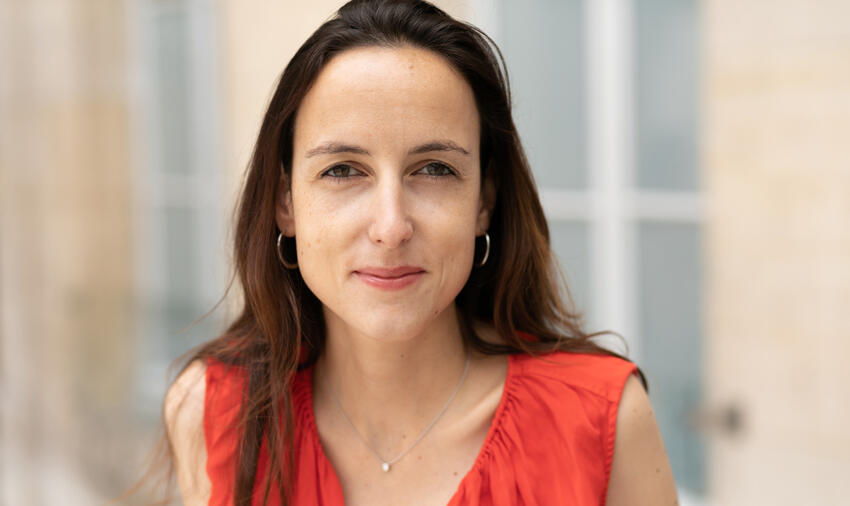
 Julia Cagé - © Celine Bansart / Sciences Po
Julia Cagé - © Celine Bansart / Sciences Po
Inspired by the American Economic Association’s John Bates Clark Medal, Le Monde, French daily, and the Cercle des économistes, created the prize in 2000, to highlight the work of France’s best young economists and to make better known the multiple facets of economic science.
In awarding the 2023 Best Young Economist Prize to Julia Cagé ex aequo, with Vincent Pons (Harvard Business School), the jury has chosen to throw its projector on a particular research area in economics: works that analyse the current crisis in democracy. This area is firmly rooted in the concepts and methods of economics but also falls under the purview of political science – its current prevalence is related to growing concerns about the relationship between the economy and political power.
The list of concerns the Cercle des économistes evokes - the impact of the concentration of the media on the quality of information; the spread of disinformation on social networks; the funding of democracy and determinants of electoral participation - reads very much like a research statement that could be drafted by Julia Cagé!
Published in the leading journals, Julia Cagé’s work focuses on media economics, political participation and political attitudes.
In 2021 she was awarded an ERC Starting Grant for her 5-year project Campaign Finance, Information and Influence: A ComprehensIve Approach Using Individual-Level Data and Computer Science Tools (PARTICIPATE) which studies, notably, blindspots in the economic literature on the funding of political parties and the representativity of candidates for their electoral campaigns.
Her latest research projects, selected recently by McCourt Institute for substantial grants in 2022 and 2023, explore issues related to information in the digital age (the spread of disinformation on social media and online news) but also look at resolving them (how to slow down disinformation, how to ensure access to quality information).
Julia Cagé is also well-known to the general public for her books in which she proposes concrete, radical solutions after meticulously scrutinizing her topic. She has authored three books on the media, one of which - Saving the Media. Capitalism, Crowdfunding and Democracy (Paris, Le Seuil, 2015) - was awarded the Special Jury Prize for Best Book on Media of the 2016 edition of the “Prix des Assises du Journalisme”. Her latest critically acclaimed work « The Price of Democracy » (at Fayard in 2018, English edition at Harvard University Press, 2020) was awarded the Prix Pétrarque de l’essai by Le Monde and France Culture in 2019.
Proposing a solution to the problems she rigorously analyses using the economist’s toolbox, is a hallmark of Julia Cagé’s work. This aligns with the Best Young Economist Prize: the award showcases the ability of the laureate to trace a useful lead in answering the most pressing socioeconomic questions of the day.
With the awarding of the 2023 “Meilleure Jeune Economiste” Prize to Julia Cagé, the Department's permanent faculty members have been distinguished by the Cercle des économistes 12 times – seven faculty members are laureates of the prize (in 2020, Isabelle Mejean was the last to win it) and another five have been nominated for it.
Congratulations to Julia Cagé as well as to her co-laureate Vincent Pons!
Read more about Julia Cagé and her research
Read Le Monde interview with Julia Cagé and Vincent Pons, co-laureates (May 22nd, 2023, in French)
Read more about the Cercle des économistes: Prix du Meilleur Jeune Économiste
Julia Cagé is Associate Professor of Economics (with tenure) the Department of Economics and a Research Fellow at the Centre for Economic Policy Research (CEPR), where she also leads the Research and Policy Network on “Media Plurality”. She is co-director of the Laboratory for Interdisciplinary Evaluation of Public Policies (LIEPP)’s “Evaluation of Democracy” research group. She has published articles in journals such as the Review of Economic Studies, the American Economic Journal: Applied Economics, the American Economic Journal: Microeconomics, the Journal of International Economics, and the Journal of Public Economics.
2023 QS Rankings: Sciences Po Third in the World in "Politics"

 QS 2023:Sciences Po Ranking
QS 2023:Sciences Po Ranking
22 March 2023
For the fifth consecutive year, Sciences Po is among the top three international universities in the Politics category, according to the 2023 QS Rankings by discipline revealed today. Thus, Sciences Po remains the leading university in the European Union in this discipline, a position it has now occupied for 8 years.
Academic and Research Excellence
These results attest to the excellence of the courses provided and the research led at Sciences Po. By maintaining its position in the world's top 3, Sciences Po is ahead of the London School of Economics and Political Studies (LSE) and Stanford University.
Every year, the QS Rankings by discipline compares more than 1,500 universities worldwide. The results of this ranking have shown, year after year, that Sciences Po is one of the world's leading universities in humanities and social sciences.
Stand out results in other disciplines
Sciences Po's high quality teaching and scientific research activities also make it possible for the institution to stand out in other discipline-based rankings:
- Social Policy and Administration: Sciences Po recorded an increase of seven places and is thus ranked 13th in the world and maintains its first place in the European Union.
- Sociology: ranked 27th worldwide (up by four places) and second in the European Union.
Congratulations to professors and researchers
"Once again this year, Sciences Po is recognised worldwide for its excellent results in the world's reference rankings. For 150 years, our institution has been educating open and enlightened minds capable of understanding the challenges of the world in which they live. These rankings show that Sciences Po is successfully taking up the challenge of achieving excellence, while at the same time expanding its geographical and social reach, especially through its particularly ambitious equal opportunities policy. I warmly congratulate all the teachers and researchers at Sciences Po for their high-quality work."
Sergei Guriev, Provost at Sciences Po
Useful Knowledge About Wars and Peace. The Latest Dossier of Cogito

 «Faites la paix, pas la guerre» par Banksy
«Faites la paix, pas la guerre» par Banksy
Discover the new issue of Cogito!
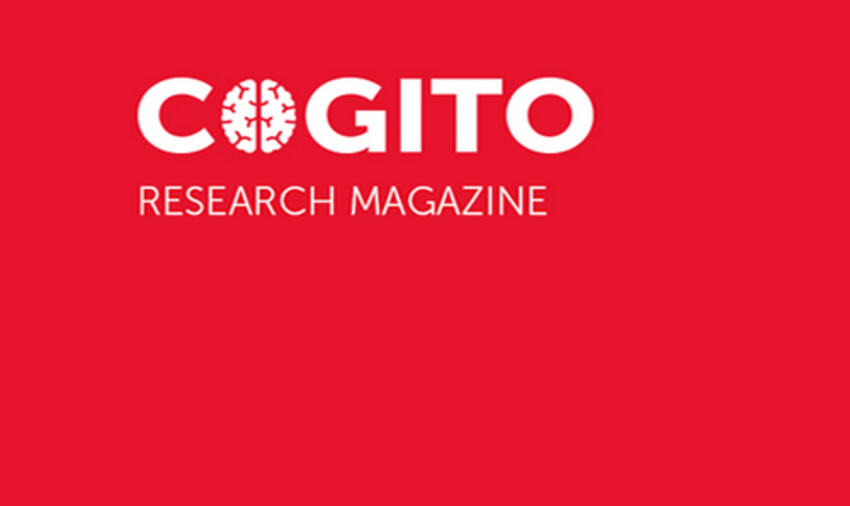
 Actualité Sciences Po
Actualité Sciences Po
Origins of Wealth and Inequality. An exceptional conversation with Oded Galor - Nov. 30th, 6.15 p.m.
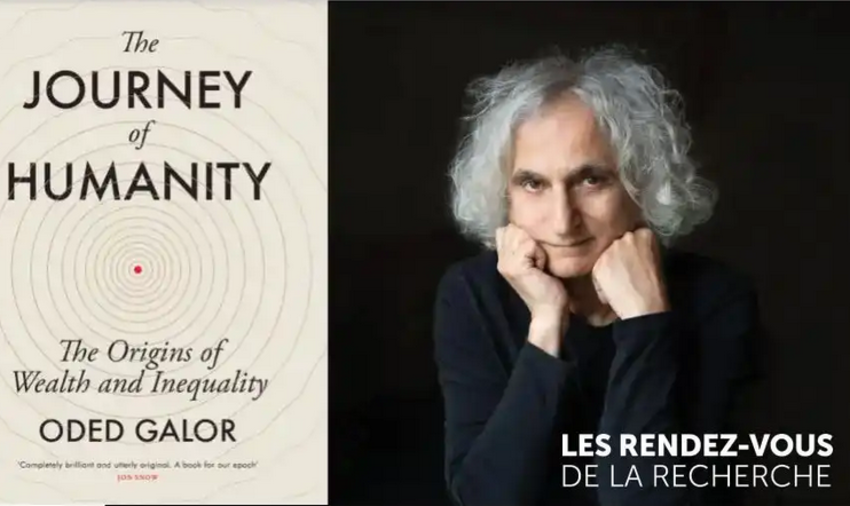
 Actualité Sciences Po
Actualité Sciences Po
Conference-debate
November, 30th - 6.15 p.m - 8.15 p.m - Amphithéâtre Simone Veil - 28 rue des Saints-Pères, 75007, Paris
In the framework of Sciences Po's Rendez-vous de la Recherche, a discussion around the book “The Journey of Humanity: The Origins of Wealth and Inequality”, with author Oded Galor, Herbert H. Goldberger, Professor of Economics at Brown University and the founding thinker behind “Unified Growth Theory”, which seeks to uncover the fundamental causes of development, prosperity and inequality over the entire span of human history.
Discussant: Benjamin Marx, Assistant Professor of Economics at Sciences Po.
The conference will be followed by a cocktail.
Registration for Sciences Po's members
Registration for external public
Don't forget to take your registration confirmation with you.
About the book (published in 30 languages):
In a captivating journey from the dawn of human existence to the present, world-renowned economist and thinker Oded Galor offers an intriguing solution to two of humanity’s great mysteries. Why are humans the only species to have escaped - only very recently - the subsistence trap, allowing us to enjoy a standard of living that vastly exceeds all others? And why have we progressed so unequally around the world, resulting in the great disparities between nations that exist today?
Immense in scope and packed with astounding connections, Galor's gripping narrative explains how technology, population size, and adaptation led to a stunning “phase change” in the human story a mere two hundred years ago. But by tracing that same journey back in time and peeling away the layers of influence - colonialism, political institutions, societal structure, culture - he arrives also at an explanation of inequality's ultimate causes: those ancestral populations that enjoyed fruitful geographical characteristics and rich diversity were set on the path to prosperity, while those that lacked it were disadvantaged in ways still echoed today.
As we face ecological crisis across the globe, The Journey of Humanity is a book of urgent truths and enduring relevance, with lessons that are both hopeful and profound: gender equality, investment in education, and balancing diversity with social cohesion are the keys not only to our species’ thriving, but to its survival.
About the Author:
Oded Galor is the founder of Unified Growth Theory. He has contributed to the understanding of the process of development over the entire course of human history and the role of deep-rooted factors in the transition from stagnation to growth and in the emergence of the vast inequality across the globe. Moreover, he has pioneered the exploration of the impact of evolutionary processes, population diversity, and inequality on the process of development over most of human existence. His research has redirected research in the field of economic growth to the exploration of the long shadow of history and to the role of biogeographical forces in comparative economic development. It has spawned the influential literatures studying the impact of inequality on the process of development, the interaction between human adaptation and economic development, the transition from stagnation to growth, and the impact of human diversity on comparative economic development.
Oded Galor was awarded Doctorate Honoris Causa from UC Louvain and from Poznan University of Economics & Business. He is an elected Foreign Member of Academia Europaea and an Elected Fellow of the Econometric Society. He has been a co-director of the NBER research group on Income Distribution and Macroeconomics, a Research Fellow of CEPR, GLO, and IZA, a Research Associate of the NBER and CESifo, a Sackler Fellow at Tel-Aviv University, and a Fellow of the Hebrew University. Furthermore, he is the Editor in Chief of the Journal of Economic Growth, Editor of the Journal of Population Economics, and Co-Editor of Macroeconomic Dynamics.
This event is jointly hosted with the INSEAD James M. and Cathleen D. Stone Centre for the Study of Wealth Inequality.

The Permanent Faculty Is Enriched With Six New Members. Discover Their Profiles
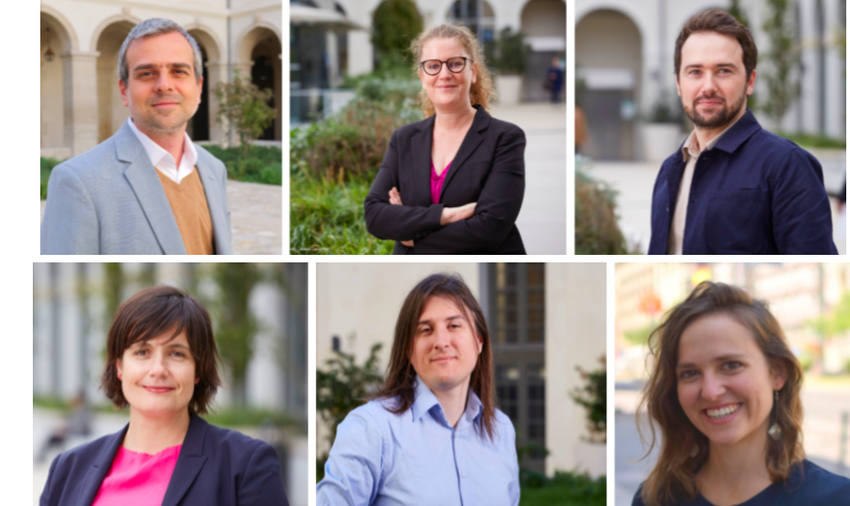
 Actualité Sciences Po.
Actualité Sciences Po.
This year, the same number of women and men are joining the permanent faculty. It’s a first. Although they are less numerous than the years before - a long term effect of the pandemic - their profiles are a tribute to the diversity and quality of our hiring policy. They come from Brazil, Sweden, Austria, Spain or France, to bring their own spin on our research and teaching about major challenges such as the environment, inequalities, conflicts, campaign promises and the behaviour of economic actors.Discover their bios!
CIVICA: 11 New Innovative Research Projects

 Actualité Sciences Po
Actualité Sciences Po
Our societies are facing major challenges: rising extremism and violence, persistent discrimination, difficulties in establishing environmental public policies, slowness of the financial sector to commit to a low-carbon economy... It is to all these questions, to which politicians are in a hurry to respond, that our researchers have decided to tackle within the framework of CIVICA Research. The added value of CIVICA Research is its capacity to bring together diverse approaches from across the social sciences on major global and uniquely-European challenges.
Following CIVICA's third call, eleven projects have been selected for funding totaling €350,000. Most of them bring together two or three CIVICA partners, with the biggest project about Migrants’ integration in EU countries (MERITA), involving all ten CIVICA alliance institutions. Six projects gather faculty and researchers from Sciences Po, four of which are led or co-led by Sciences Po.
Projects led by Sciences Po
European Polarisation Observatory Working Group (EPO - WG)
The study of the social and political impact of social media has become an important stream of research, not least for its relation with growing anxieties regarding political polarisation and extremism, fragmentation of internet communities into so-called bubbles, and misinformation, to name a few. Large-scale studies of socio-political dynamics on internet platforms and AI systems mediating them are becoming a driving force for evidence-based policy, shaping the future of internet regulation.
These studies hinge on conceptualisations and operationalisation of opinions: Do
algorithmic recommendations propose politically-diverse content piercing filter bubbles? Do users connect only with like-minded others forming echo chambers? Does political extremism relate to misinformation? Recent advancements in network scaling methods, have shown that digital behavioural traces in social media platforms can be used to mine opinions at a massive scale better than traditional polls and surveys.
In its first phase, the project (funded under the first call) developed new methods to better understand polarisation in Europe. Their results cover algorithmic recommendation, democratic back-sliding, new media dynamics, the emergence of illiberal attitudes and mistrust of institutions, misinformation, and polarisation and fragmentation of the digital public space. With this second phase of the project, the research team seeks to build a European Polarisation Observatory into a social media observatory infrastructure, providing political opinion data driving research in diverse areas of social sciences across CIVICA.
Partners : Sciences Po médialab, Central European University and Bocconi University co-lead this research.
Sciences Po principal investigators: Jean-Philippe Cointet, Associate Professor & Pedro Ramaciotti Morales, post-doc, médialab
Local democracy and state power: Immigrant inclusion or marginalisation? (LOCALDEM)
LocalDem explores the links between politics and policing at the local level since 2000. Anti-elite right-wing populists rise to power, in part, through their efforts to link immigrants with crime in voters’ minds. Once in power, aggressive policing is one of their first policy goals. Thus, nearly all European democracies face the challenge of fighting crime without further marginalising low-income, minority, or immigrant groups.. The research team will explore how a greater police presence combined with greater local accountability affects social dynamics. Specifically, the researchers will study the effects of recent expansions of municipal police departments in France. They will start by documenting the correlations between local police presence on the territory and a wide range of demographics, crime rates and political opinions. They will collect and digitise novel data on parties’ manifestos in municipal elections. This database will become publicly available at the end of the project. Text analysis from this source and election results will allow them to study the effects of the police-promising party narrowly winning or losing the election. With this design and individual level data, they will study not only how a local police force affects crime and arrests, but also migration, housing values, and educational and employment outcomes, particularly among disadvantaged members of the population.
Principal investigator: Roberto Galbiati, Research Professor (CNRS), Department of Economics
Stockholm School of Economics is part of this research.
Towards a common framework for evaluating EU's policy effectiveness in achieving its Green transformation goals (EVALEU)
With the Green Deal, the European Union embarked on a mission to aim for the fastest worldwide transition to a green economy with low emissions. These aims require a paradigmatic shift in the function of its economy and significant socio-economic strain and would depend on upgrading the EU’s institutional capacity to evaluate and monitor policy implementation. Overall, the EU’s effort to become the global leader in combating climate change and environmental degradation could be successful if the policy instruments
deployed towards these ends are carefully calibrated to ensure a continuous progression of its Member States’ to achieve its environmental goals. To understand the extent to which the current policy targets can be achieved and what modifications would be required, we must evaluate the EU's success so far in achieving the targets set in its previously adopted environmental policies. This project elaborates the first steps for such a framework by comprehensively systematising the current knowledge of the EU’s approach and capacity for policy ex-ante and ex-post policy implementation in the field of environmental policy.
The Centre for European Studies and Comparative Politics at Sciences Po, Central European University and National University for Political Studies and Public Administration co-lead this research.
Sciences Po principal investigator: Matthias Thiemann, Associate professor, Centre for European Studies and Comparative Politics.
Greening or greenwashing banks? Climate conscious bank stakeholders and their impact (GREENINGBANKS)
Limiting global warming over this century to a level consistent with the Paris Agreement of 2015 requires channelling trillions of dollars towards the green transition. Private banks are expected to play a major role in this process. What factors will drive banks to finance the transition at the global scale? Are banks up to the task? How can various stakeholders like depositors, shareholders, and regulators exert pressures on banks? This project addresses these questions by first examining how environmentally-minded depositors can influence banks, using detailed data from France. A second part of the project will expand on other stakeholders to discuss what factors impede or favour the transition at a global scale.
Principal investigator: Michele Fioretti, Assistant professor, Department of Economics
Bocconi University is part of this research.
Projects with Sciences Po's participation
Migrants’ integration in EU countries: for a selected few only? Current shifts in conceptions of integration and impact on social and ethnic inequalities in host countries (MERITA)
The idea of this project is to develop a multi-disciplinary forum about integration of migrants in Europe, across social sciences and including representatives of all current CIVICA partners (10 institutions).
A forum intends to identify grounds for contemporary conceptualisations of integration of migrants in EU countries and to problematise them. What
are current logics in thinking about integration and what are the potential implications of these logics are the core research questions, in particular, regarding the possible creation of increased social and racial inequality in societies.
This research is led by Stockholm School of Economics.
Bocconi University, Central European University, European University Institute, Hertie School, IE University, London School of Economics and Political Science, Sciences Po Centre for Political Research (CEVIPOF) and Centre for Research on social Inequalities (CRIS), SGH Warsaw School of Economics and National University for Political Studies and Public Administration are part of this research.
Explorative cases of sustainability and climate change discourse dynamics on social media combining text and network analyses (DYSTENA)
This project seeks to contribute to the development of computational tools for the analysis of
text data to help track the dynamics of discourses on social media and examine how these influence policies and norms. As media has shifted towards digital media where anyone can produce messages with wide visibility, the new forms of communication require
new tools for researchers to analyse and understand their roles in the development of norms and policies. The research team will study two independent cases, to understand (1) how diplomats use their social media presence to interact with other diplomats and the public and influence climate negotiation with their presence online, and (2) how activists individuals and organisations use their social media presence to diffuse sustainability ideas and norms which influence companies’ behaviour regarding sustainability and climate issues.
This research is led by Stockholm School of Economics.
Bocconi University, Central European University and Sciences Po Centre for International Studies (CERI) are part of this research.
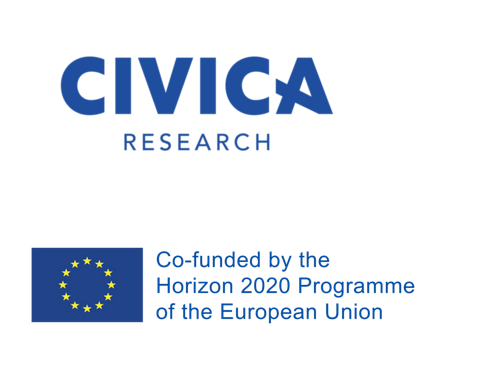
*The CIVICA Research project aims at endowing CIVICA - The European University of Social Sciences - with the instruments of an ambitious and innovative research strategy in order to create a joint, long-term research environment for the alliance. CIVICA Research received €2m in funding from the EU programme Horizon 2020 to enable researchers to conduct joint scientific activities. Find out more about CIVICA Research.
Times Higher Education Ranking: Sciences Po places 39th in the world for the social sciences

 Actualité Sciences Po
Actualité Sciences Po
Times Higher Education Ranking: Sciences Po places 39th in the world for the social sciences
Sciences Po has risen 11 rungs this year in the Times Higher Education World University Ranking for the social sciences. This improved performance was made possible by its cutting-edge research and international outlook.
Times Higher Education (THE), whose world ranking is one of the most highly regarded in the sector, has just published its university statistics by subject. This year, Sciences Po has climbed into the top 40 social science universities worldwide. Placing 39th in the world, the university has risen 11 places compared to last year’s results. In the space of two years, Science Po has risen 29 places in the ranking. This improvement is linked to its research activities and the increasing internationalisation of the university.
Sciences Po has made particular progress in research (+8 points) and teaching (+4 points). Meanwhile, the university retains its strong position with regards to “Citations”, a criterion that determines the influence of a university’s research worldwide. This is Sciences Po’s greatest strength in the ranking. It also continues to score highly in the “International outlook” performance indicator, which assesses the institution’s attractiveness among students and academics.
THE now places Sciences Po higher than Southern California University, California, San Diego University, King’s College London and McGill University.
Sciences Po has also risen from second to first in France in the THE World Rankings by country. That put it above Paris Sciences et Lettres (PSL), the collegiate university that brings together some of the leading French institutions in the social sciences (École normale supérieure, Ecole pratique des hautes études and Université Paris Dauphine).
Find out more
- THE World University Rankings by subject
- THE Stats for Sciences Po
- Performance in the 2022 THE World Rankings

